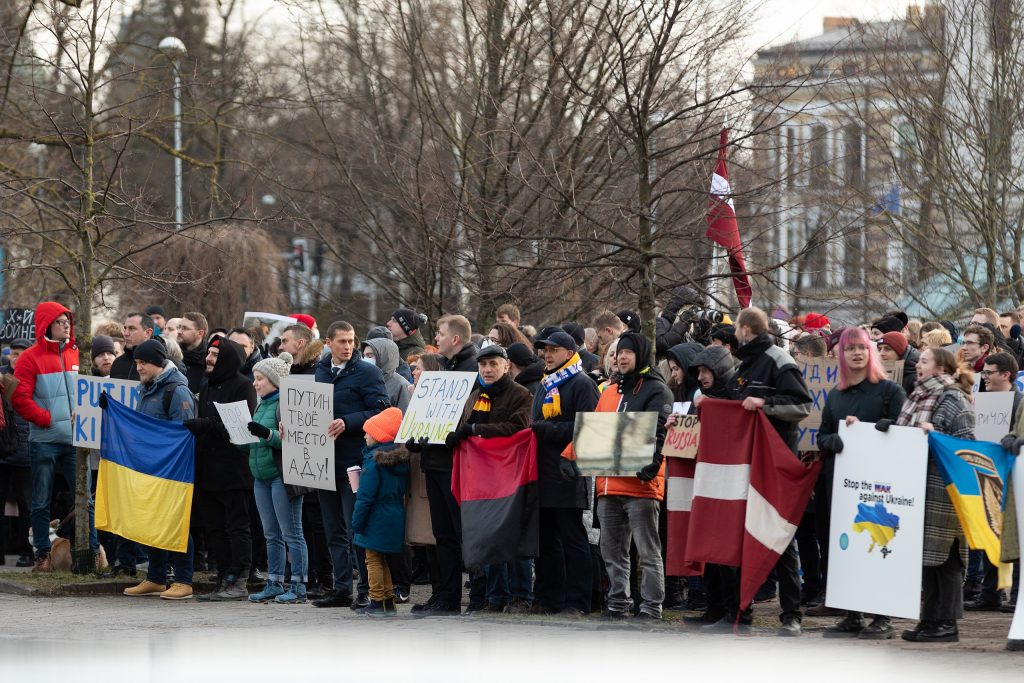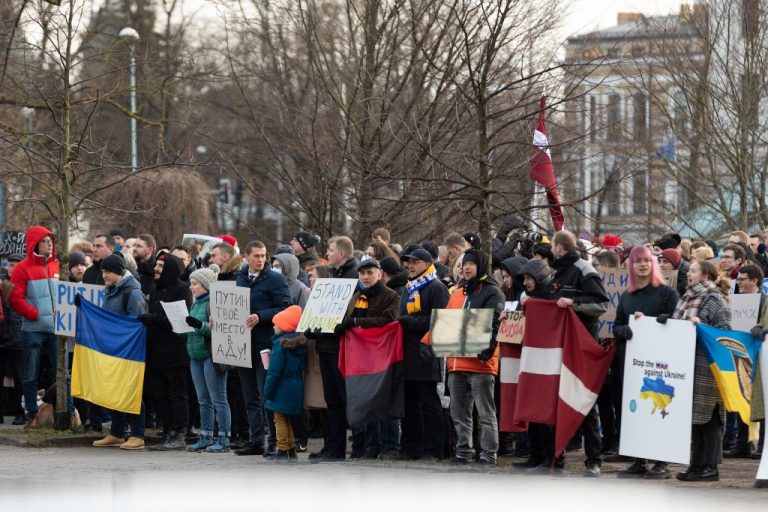Jürgen Habermas and Jacques Derrida, two of Europe's greatest modern philosophers, published a joint article in 2003 that was published in leading newspapers in both Germany and France. There they criticized the US invasion of Iraq, and called on Europeans to “take a reflexive distance from themselves,” especially in accordance with European imperialism and colonialism. In their critique of American neo-imperialism, Habermas and Derrida offered a theory of post-imperial Europe, which could realize Immanuel Kant's ideas about international politics and peace.
Criticisms of the Bush administration's imperialism were justified, and the suggestion that Europe could lead the world toward a post-imperial future was a good one. On the other hand, the Russian invasion and genocide in Ukraine cast doubt on the possibility of achieving a post-imperial world by the means proposed by the two philosophers.
They envisioned a Europe of dialogue and conversation, where differences are embraced. This is definitely a classy idea. The problem is that she is powerless in the face of evil.
After World War II, Europe focused on peace as a matter of course. The question is how the territories of peace should be expanded, but not how they should be defended. Abolishing borders was an attractive idea among Europeans, so that goodness would spread (as a moral concept, not just as economic goods). They did not care about how to strengthen the borders to defend them against evil. The question of evil became relativized, as they believed that all evil could be reintegrated simply by making good seem more attractive. This was the basis for Europe's (primarily Germany and France) long-standing relationship with Russia. Europe took Goethe's Faust literally when it tried to make a deal with the devil. They have forgotten how the story of Faust and Mephistopheles ends.

Riga 02.24.2022 / Saimaa, CC BY-SA 2.0, via Wikimedia Commons
Europe and the continent's central intellectuals, including Habermas and Derrida, also forgot some basic principles of the European project. Not the “free market” or “economic integration” or even the elimination of borders, but the necessity of confronting the idea of empire with the values of the republic.
Post-war philosophers articulated how imperialist (and to some extent post-imperial) states could overcome their instincts. But they were oblivious to what a non-imperialist society should do in the face of new imperialist aggression.
The answer to this question lies in the origins of the European project.
Richard Nicholas von Coudenhof-Kalerg – author of the prophetic Pan-European (1923) – has been hailed as a visionary “pioneer” of post-war Europe. However, his most important arguments have been largely forgotten, such as: How could a republic – at least the smallest and weakest – defend itself against aggressive empires (Germany and Russia at the time)?
Coudenhof-Kalergi had a clear answer: only a confederation, or security union – not just an economic or political union – would be able to ward off attacks against smaller individual states. It was to be a union that sought to balance the benefits of peace with the need for defence. Balance between agora and agun.
Agora and Suffering: Europe's Double Heart
Europe is built on two moral systems; Two ways of defining attitudes toward the other.
The first is the agora, which assumes exchange. In Agora, we give up something to get back more than we originally had. We exchange goods, objects, ideas, stories and experiences. Agora is a game where the sum is positive: everyone wins, even if some try harder than others.
The second is torment, the battlefield. We enter the conflict, not for the sake of change, but for the sake of fighting. We dream of winning, but we are also willing to lose, and even literally lose ourselves, by dying for a noble cause. This is not the logic of a positive-sum game, where one side must lose.
Europe was built on a mixture of agora and suffering, on the idea of the knight and the bourgeoisie. The European cultural heritage is inconceivable in the absence of an ethics of conflict: whether it be in medieval novels and the cultivation of chivalry and loyalty, or plays where characters stand and die for their principles and passions. But Europe also undoubtedly constitutes an agora culture: dialogue, compromise, and leniency, qualities that Voltaire valued highly.
The European literary canon does not lack criticism of both Agora and Agon – they went even further. This applies to attacks on the culture of chivalry and war (from Cervantes to Remarque), and on the bourgeois “culture of exchange” (from Molière to Balzac).
Both moral systems are based on deep human values. But in its most extreme forms, it is dangerous and must be balanced with the other.
Conflict ethics teaches us to see all people as potential enemies, and to view every interaction as a potential conflict. This could lead to all-out war. The “state of nature” described by Hobbes in Leviathan is actually a highly sophisticated social development that focused absolutely on the moral order of war, understanding all others as threats.
In contrast, the radical ethics of Agora is absolutely focused on exchange and compromise. Here, exchange and dialogue are the answers to all questions. War and conflict are the results of a lack of human rationality, and the only reason people fight is because they do not have enough opportunity for dialogue. If the logic of the agora becomes universal and absolute, we will lose the sense of where to stop in our longing for exchange. We cannot and should not talk to a killer at the moment he is about to kill us, and we cannot and should not trade the lives of our loved ones or our fellow citizens for anything else.
Truth and justice thus balance the desire for exchange with our understanding that some things are irreplaceable and cannot be exchanged, such as human life.
Why were Habermas and Derrida right – and wrong?
Despite their philosophical differences, Habermas and Derrida agreed that the agora should replace agony entirely.
Habermas places his faith in communication, where everyone should be able to adapt their positions when faced with new rational arguments. Derrida built his philosophy on the idea that Western metaphysics is the dictatorship of the presence, the irreplaceable voice of the metaphysical father, and that the only way to confront it is through endless replacements and reinterpretations. This is what the Bible called.
While Habermas attempts to ensure the supremacy of reason, Derrida is concerned with the continuity of what escapes the control of reason. However, they both believed that the eternal process of exchange and substitution was the solution to the religious and metaphysical dogmatism of previous ages. They both tried to undermine the idea that something is irreplaceable.
None of them admitted that agora is impossible without torment. You can't have endless dialogue in a city-state unless you build a fortress that protects your city from possible destruction. Europe during the era of Habermas and Derrida was built on the naive belief that all enemies had disappeared and that security was nothing to worry about. They ignored the possibility that the enemy would not leave until he had killed our children.
The hypocrisy inherent in the idea of Europe as a continent of “eternal peace” and “endless arenas” is that this can only be achieved under the security umbrella of NATO. Habermas and Derrida were right to criticize the inhumanity of US imperialism, but they were wrong to reject the United States as Europe's main partner and alternative self. While Europe built welfare states, the Americans built a security infrastructure on which Europe relied so that it could continue to be a social paradise. The United States is not from Mars, and Europe is not from Venus, as Robert Kagan believed. America has just filled the conflict gap (i.e. walls) left by Europe in its firm belief in peace and the spontaneous reproduction of the Agora.
Why is 2023 different from 2003?
If our goal is to build a more just post-imperial world, it is important to look at the similarities between the US invasion of Iraq in 2003 and the Russian invasion of Georgia in 2008, Ukraine in 2014, Syria in 2015, and Ukraine again in 2022. There are some important differences between these.
The 2003 war occurred when democracy deceived itself, hiding its imperialism behind seductive democratic rhetoric. This was partly because the “Western” world believed that it was so powerful that it believed it could do whatever it wanted – a path that led directly to tyranny. 2003 was the result of an outdated confidence – stemming from the idea of the “end of history” – that did not know how to respond to the shock of 2001.
After 20 years, we live in a different reality. Democracy is no longer turning into an empire, but is being attacked by the empire. This empire and its authoritarian allies see democracies as weak and unprotected. They lost the will to suffer. They make fun of the Persian culture of the past. Thus it can be attacked and eventually destroyed.
The Russian invasion of Ukraine is an attack on Europe. Russia is at war with Europe. It is time to accept this and draw all the necessary conclusions. The agora is not enough, sometimes it must be defended, and torment must be revived as an identity.
Not because one seeks war, but because one is sometimes forced to war. To defend peace, one must become a warrior – or at least side with the warrior as much as possible.
Sometimes avoiding evil is not enough. Sometimes you have to face it head on.
This translation was contributed by Samtiden.








